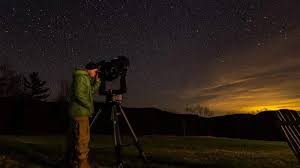Exploring the Night Sky: Essential Stargazing Equipment for Beginners
Stargazing is a fascinating hobby that allows us to marvel at the beauty of the night sky and explore the wonders of the universe. For beginners looking to embark on this celestial journey, having the right stargazing equipment is essential. Here are some must-have tools to enhance your stargazing experience:
Telescope
A telescope is perhaps the most important tool for stargazing. There are various types of telescopes available, but for beginners, a good quality refractor or Dobsonian telescope is recommended. Make sure to choose one with a stable mount and good optics for clear viewing.
Star Chart or Astronomy App
Having a star chart or using an astronomy app on your smartphone can help you navigate the night sky and identify constellations, stars, and planets. These tools are invaluable for beginners to learn about different celestial objects.
Red Flashlight
A red flashlight is essential for stargazing as it helps preserve your night vision while allowing you to see in the dark without disrupting your eyes’ adaptation to low light conditions.
Binoculars
Binoculars are a great alternative to telescopes, especially for beginners. They provide a wider field of view and can be easier to use when starting out in stargazing. Look for binoculars with good magnification and lens quality.
Comfortable Seating and Warm Clothing
Stargazing often involves spending long hours outdoors, so make sure you have comfortable seating such as a folding chair or blanket to sit on. Additionally, dress warmly in layers to stay comfortable during chilly nights.
With these essential stargazing tools in hand, beginners can start their journey into the captivating world of astronomy with confidence and excitement!
Beginner’s Guide to Stargazing Equipment: FAQs on Starting, Costs, and Choosing the Right Telescope
- What do you need to start stargazing?
- Is stargazing an expensive hobby?
- What is the best telescope for beginners to see planets and galaxies?
- What equipment do you need to stargaze?
What do you need to start stargazing?
To start stargazing as a beginner, you will need a few essential tools to enhance your celestial experience. Firstly, investing in a reliable telescope is key to observing distant stars, planets, and galaxies. A star chart or astronomy app can help you navigate the night sky and identify various celestial objects. Additionally, having a red flashlight is crucial for preserving your night vision during stargazing sessions. Binoculars can also be a valuable tool for beginners, providing a wider field of view for easier observation. Lastly, ensure you have comfortable seating and warm clothing to stay cozy during long nights spent exploring the wonders of the universe. With these basic stargazing essentials, you can embark on your journey into the captivating realm of astronomy with confidence and excitement.
Is stargazing an expensive hobby?
The cost of stargazing as a hobby can vary depending on the equipment and resources you choose to invest in. While there are expensive options such as high-end telescopes and specialized cameras, stargazing can also be enjoyed on a budget with simpler tools like binoculars or a basic telescope. Many stargazing enthusiasts find that starting small and gradually upgrading their equipment as they delve deeper into the hobby is a practical approach. Ultimately, the beauty of stargazing lies in the wonder and awe of exploring the night sky, regardless of the financial investment involved.
What is the best telescope for beginners to see planets and galaxies?
When it comes to choosing the best telescope for beginners to observe planets and galaxies, a popular recommendation is a Dobsonian telescope with a moderate aperture size. Dobsonian telescopes are known for their ease of use and affordability, making them ideal for those new to stargazing. Opting for a telescope with a larger aperture (around 6 to 8 inches) allows for better views of planets like Jupiter and Saturn, as well as some brighter galaxies and nebulae. Beginners should also consider factors such as portability, ease of setup, and quality optics when selecting a telescope that will enhance their exploration of the night sky.
What equipment do you need to stargaze?
To embark on the mesmerizing journey of stargazing, beginners often wonder about the essential equipment needed to explore the night sky. The key tools for stargazing include a telescope for magnifying distant celestial objects, a star chart or astronomy app to navigate and identify stars and constellations, a red flashlight to preserve night vision, binoculars for a wider field of view, and comfortable seating along with warm clothing for extended outdoor sessions. With these fundamental pieces of equipment in hand, aspiring stargazers can delve into the vast expanse of the universe and witness its awe-inspiring beauty.

